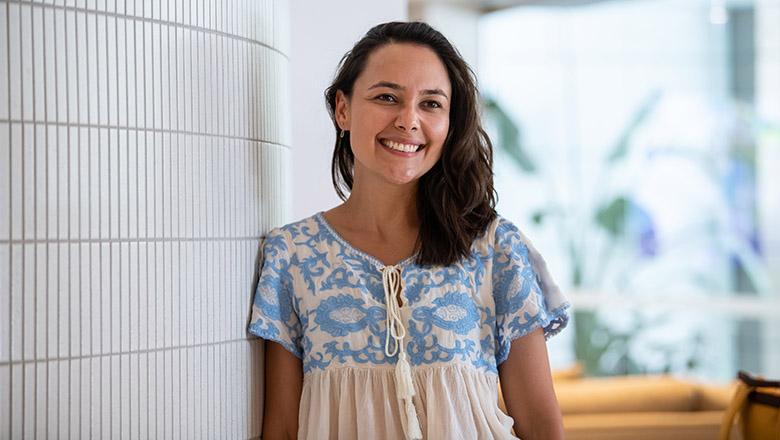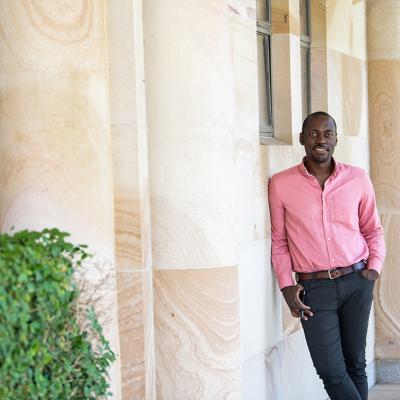Where’s the best university to do a PhD? Well, we may be a little biased, but we think it’s UQ. Here’s why.
We know there are a lot of universities to choose from when considering where to study a Doctor of Philosophy. Aside from the program structure itself, students are often interested in which university offers the best supervisors, culture, support and study experience.
We approached PhD candidate Barbara Azevedo de Oliveira to help us pinpoint what makes UQ unique and why she believes it's an appealing university for those pursuing a higher degree by research.
Throughout the article, we'll cover:
- Barbara's PhD in plant biology and journey to UQ
- Why do a PhD at UQ? Barbara's perspective
- Professional opportunities for PhD candidates at UQ
- How the UQ community welcomes PhD candidates
- The type of support available at UQ for PhD candidates
- What's unique about UQ's St Lucia campus
Is UQ the best university to do a PhD in Australia?
UQ’s reputation for research excellence is recognised locally and globally. UQ consistently ranks among the world’s top 50 universities in research-driven rankings such as the QS World University Rankings, CWTS Leiden Ranking and NTU Performance Ranking of Scientific Papers for World Universities.
Meet Barbara
Barbara is an international PhD candidate here at UQ. Her research is in plant biology and, more specifically, wattles.
“When most people think about wattles, they think of the showy golden wattle – Australia’s floral emblem,” she says.
“Well, I work on wattles, but not those ones. I research the ugly, stinky and boring ones that cover much of outback Queensland.”
These types of wattles aren’t as boring as you might think though.
“Some of these wattles are so dominant that their name is used to describe the entire ecological community in which they occur, such as the Brigalow Belt or Gidgee Country,” says Barbara.
But despite their ecological importance, we still don’t know much about them. Furthermore, it can be difficult to distinguish between different types of wattles, including the poisonous and non-poisonous gidgees. Part of Barbara’s PhD will involve developing a key to help everyday Australians and scientists alike identify the type of wattles in their area, so we can better understand and protect the native plant.

Why do people do a PhD at UQ?
What sparked Barbara’s passion to pursue a PhD at UQ? Like many international students, she seized a study abroad opportunity during her undergraduate program, then fell in love with UQ’s St Lucia campus and its people.
“I was awarded a Brazilian government scholarship called Science Without Borders to study at UQ for 18 months,” she says.
“That experience changed my life and career path.”
Barbara learnt English at UQ College and then spent a semester studying at the School of the Environment.
“The school has excellent infrastructure and new ways of learning with leading researchers."
Since then, she knew she wanted to return to continue postgraduate education at UQ.
“When I returned to Brazil, I decided to improve my research skills and do a master’s to have better chances to apply for a PhD in the future,” Barbara says.
“Years later, I contacted one of the professors I met during my studies and with whom I undertook a summer internship, and I applied for a PhD position at UQ under his supervision.”
What makes UQ the best university to do a PhD at?
Search ‘best university for PhD in Australia’, and UQ will come up on the list. But when there are so many top-notch Australian universities to choose from for studying a Doctor of Philosophy, you might be wondering what sets us apart. Barbara helped us break it down.
Professional opportunities
When asking ‘why do you want to do a PhD?’, the response is often to pursue research passions and progress professional qualifications. For most industries, however, having the piece of paper simply is not enough. You need to be able to demonstrate your skills and highlight extracurricular workshops, conferences, networking events and presentations you have participated in. So, you need to undergo study at a university that offers plenty of opportunities to enhance your professional development.
All researchers at UQ have access to a Career Development Framework to help them capitalise on their research skills and translate them into industry practice. They can also work with UniQuest, our commercialisation company, to take their research to market and turn their academic discoveries into commercial products.
“One of the benefits of doing a PhD at UQ is how many activities and learning resources are available,” says Barbara.
While studying her PhD, Barbara has participated in workshops, webinars and placements to help her hone her career direction and goals, and build upon her professional skills.
Barbara belongs to several societies and discussion groups at UQ and beyond, including the UQ Postgraduate Society and the Centre of Biodiversity and Conservation Sciences.
“These experiences help me to interact with specialists in my area, get different and new perspectives from other institutions, discuss papers and ideas, and have a broader network in the systematic field,” she says.
Barbara has also benefited from tutoring opportunities, sharing her knowledge with undergraduate students studying plant identification and terrestrial ecology. As part of this experience, she’s travelled to Carnarvon Gorge, where she learnt a few new things herself.
“The engagement with the students – teaching them about plants in the field while walking in a pristine area, was incredible,” she says.
“So was all the other knowledge I have acquired, such as about Aboriginal culture, animal diversity and geology.”
“It was one of the most incredible experiences I have ever had.”
Community
UQ attracts students from all over the world, and each person contributes to our vibrant community. In turn, we want to ensure community members from different cultures and backgrounds feel welcomed, celebrated and empowered.
“UQ is multicultural, and they implement important policies to make everyone welcome and show how valuable each student is,” says Barbara.
From festivals to workshops and discussion panels, UQ recognises important cultural events and holidays to celebrate diversity and share the community spirit.
But encouraging a sense of community isn’t only about hosting big events. It’s about the everyday stuff too. Barbara realised this when she was studying remotely from Brazil, which she found challenging and sometimes isolating. With the support of her PhD supervisors, however, she found an online community of like-minded individuals to share her experiences with.
"My co-supervisor runs a discussion group every Friday; she invited me to participate in it since the beginning, even when I was still unsure when I would start my PhD,” she says.
“That was my first contact with my colleagues, where we would discuss papers and share fieldwork experience.”
The academics and research students at UQ aren't just welcoming and wise. They're also the most influential and highly cited researchers in Australia. This means you'll study your PhD alongside people who can challenge your thinking while brightening your day.

Support
UQ offers a range of practical and emotional support services for students, from help with finding somewhere to live to emotional support groups and resources to manage stress.
Barbara has accessed some of these during her PhD. At the start of her studies, while she was working remotely in Brazil, she realised she needed to seek advice and support to look after her mental health.
“I started counselling once a month, and that was life-changing for me,” she says.
“With the counselling from UQ, I started to be kinder with myself and understand that there are so many PhD students going through the same uncertainties as I was.”
Barbara also sought out financial support at UQ, to ensure she wouldn’t be held back from important networking and professional development opportunities.
“Coming from a developing country where, unfortunately, there are not many funds for research compared to Australia, I was impressed when I learned that the university could help me financially to attend conferences even overseas and other extracurricular activities,” she says.
“I discovered that my school had free registration for students interested in attending the networking and career development conference for people from marginalised or underrepresented groups in STEM.
“I cannot wait to go to the International Botanical Congress in Madrid in a few years as well, where I will be able to share my research results.”
Campus
It may seem like a small thing compared to the considerations above, but attending a beautiful green campus every day can make a huge difference to your study experience when completing your PhD. With plenty of peaceful indoor and outdoor study spots, state-of-the-art laboratories and facilities, and a variety of cafés and restaurants on campus, everything you could need is right on your doorstep.
“The campus is gorgeous, with all the jacaranda trees which remind me of Brazil, the river and the cafés,” says Barbara.
Whether you’re wandering through the sandstone cloisters of the Great Court or watching the ducks waddle along the shores of UQ Lakes, arriving at St Lucia campus every day puts a smile on your face.
To sum up: why do a PhD at UQ?
Here's why you should choose to study your PhD at UQ, packaged up in one neat sentence, thanks to Barbara:
“What I most enjoy about studying at UQ is the cooperative research environment, all the learning resources available, and how professors and all staff make us feel important and valuable.”






